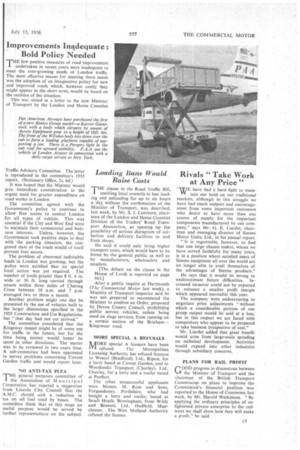Improvements Insidequate Bold Policy Needed
Page 43

If you've noticed an error in this article please click here to report it so we can fix it.
THE few positive measures of road improvement undertaken in recent years were inadequate to meet the ever-growing needs of London traffic. The most effective means for meeting these needs was the adoption of an imaginative policy for new and improved roads which, however costly they might appear in the short term, would be based on the realities of the situation.
This was stated in a letter to the new Minister of Transport by the London and Home Counties Traffic Advisory Committee. The letter is reproduced in the committee's 1955 report. (Stationery Office. 2s. 6d.) It was hoped that the Minister would give immediate consideration to the urgent need for greater expenditure on road works in London.
The committee agreed with the Government's policy to continue to allow free access to central London for all types of vehicle. This was essential if the City and West End were to maintain their commercial and business interests. Unless, however, the Government took positive steps to deal with the parking situation, the congested state of the roads would of itself prevent free access.
The problem of abnormal indivisible loads in London was growing, but the police were satisfied that no special local action was yet required. The number of loads greater than 8 ft. 6 in. wide or 36 ft. long carried through streets within three miles of Charing Cross between 10 a.m. and 7 p.m. averaged two or three a month.
Another problem might one day be presented by the use of vehicles built to the larger dimensions specified in the 1955 Construction and Use Regulations, but "that day had not yet arrived."
The committee considered that the Kingsway tunnel might be of some use for traffic in the future, but for the time being money would better be spent in other directions. The matter was to be reviewed in two years time. A sub-committee had been appointed to survey problems concerning Covent Garden traffic and would report later.
NO ANTI-TAX PLEA
TiE general purposes committee of the Association of M uni ci pal Corporation has rejected a suggestion from Lincoln City Council that the A.M.C. should seek a reduction in tax on oil fuel used by buses. The committee think that at this stage no useful purpose would be served by further representatictis on the subject.












































































































